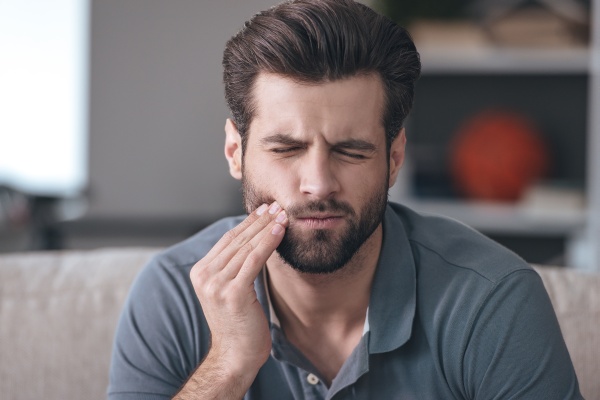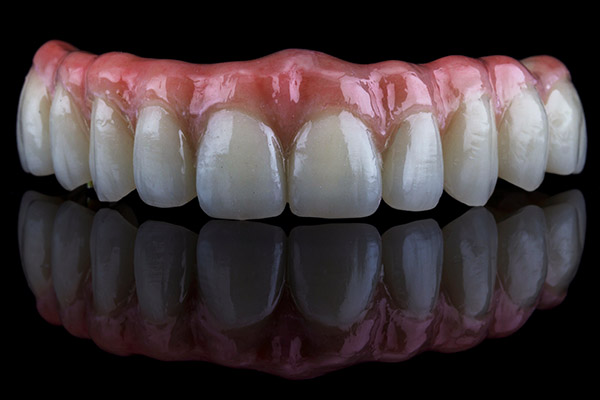Symptoms of Teeth Grinding

Take a few minutes to discover the symptoms of teeth grinding. If you notice any of these symptoms, consult your dentist. You want to work to prevent teeth grinding as soon as possible. This early prevention will reduce the risk of damage to your teeth.
The symptoms of teeth grinding
In many cases, those who experience teeth grinding do not even realize that they do. Sometimes, this lack of knowledge comes from the grinding occurring while the patient is asleep. At other times, it occurs during moments of high concentration, so the patient is distracted.
The following are some of the more common symptoms associated with teeth grinding:
- Headaches
- Earaches
- Facial pain
- Stiffness and pain in the jaw
- Sleep disruptions
- Broken fillings or teeth
- Teeth that are worn-down
- Tooth sensitivity or loss due to wearing down
The last of these symptoms require extreme cases of teeth grinding. It is rare for patients to experience worn-down teeth or the resulting tooth loss or sensitivity in most cases.
When the symptoms require a dental visit
Patients who experience the above symptoms should strongly consider visiting the dentist about possible teeth grinding. It is particularly important to visit the dentist in the case of pain in the jaw, face or ear. Patients should also visit the dentist as soon as possible in the case of worn, sensitive or otherwise damaged teeth.
Causes of teeth grinding
To some extent, the chosen prevention and treatment for teeth grinding depends on its cause. Dentists can help patients diagnose the cause of the teeth grinding. From there, patients can work to eliminate that cause to reduce the grinding. The following are some of the more common causes of this issue.
Anxiety and stress
Those with anxiety and stress may experience teeth grinding. In many cases, the patient does not even notice the grinding. Reducing the stress can reduce the grinding in this case.
Medications
Some medications can have the side effect of teeth grinding. This is particularly common among some SSRIs that treat depression. Some SSRIs linked to teeth grinding include sertraline, fluoxetine and paroxetine.
Sleep disorders
Some sleep disorders may also cause teeth grinding at night. Those with obstructive sleep apnea, for example, have a higher risk of grinding their teeth. The chances of someone with a sleep disorder grinding the teeth at night increase if the patient mumbles, talks, punches or kicks while asleep, experiences hallucinations while semi-conscious or has sleep paralysis.
Other lifestyle factors
Lifestyle factors can also increase the risk of teeth grinding. This includes using recreational drugs, smoking and drinking alcohol. Consuming high quantities of caffeine also increases the risk.
Conclusion
You can typically spot teeth grinding from pain, headaches or disruptions to sleep. If you notice any indications that you grind your teeth, you should visit the dentist. Otherwise, you may experience severe symptoms in the future, such as worn-down teeth or even tooth loss. Your dentist will suggest treatment based on your dental health and the cause of the grinding.
Request an appointment here: https://atlantapamperedsmiles.com or call Pampered Smiles at (404) 891-9489 for an appointment in our Atlanta office.
Check out what others are saying about our services on Yelp: Read our Yelp reviews.
Recent Posts
Cosmetic dental treatments can bring you closer to the smile of your dreams. The main focus of these services is to enhance the appearance of the smile, which in turn boosts confidence. They can even make oral hygiene and care easier, although that is not the primary purpose. Knowing when it is time to consult…
When it comes to replacing missing front teeth, there are options available. This article reviews some popular tooth replacement options so you can preserve your smile and your health. Due to their position, losing front teeth may undermine your self-esteem and make you less inclined to smile for photographs. However, it is about more than…
Many circumstances might cause you to look into replacing a missing tooth, regardless of your age. Those who do not take care of their teeth and gums are at particularly high risk for tooth loss, as both gum disease and decay can damage gums, tooth roots, and teeth. Cavities can lead to significant damage, as…
Dental crowns are a common restorative solution that protects damaged teeth, improves appearance, and restores proper function. The placement process follows a common step-by-step restoration. Understanding this process can help alleviate any uncertainty you may have before an upcoming appointment and prepare you for what you can expect. Each stage of the dental crown placement…


